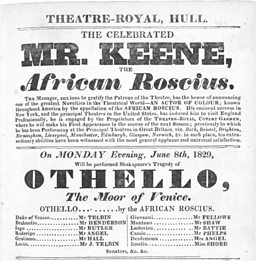The first black Shakespearean actor performs in Hull, the bastion of the anti-slavery movement
Ira Frederick Aldridge became the first black actor to play Othello. His first major performance of Othello was at London’s Royalty Theatre in 1826.
-
![]()
Much ado near me
Hear more Shakespeare stories on BBC Radio Humberside
-
![]()
Shakespeare Festival 2016
The BBC celebrates the genius of the bard

Ira paid homage to the famous actor Kean by taking his name, but with a slightly different spelling – Keene – in order to attract attention.
He also called himself 'African Roscius', after a famous Roman actor of the first century BC.
The Playbill
This playbill is one of the many thousands stored in the British Library, telling a story of the performances of Shakespeare’s work across the country.
Dated 1829, this particular playbill is working hard to attract spectators to enjoy the novelty of seeing a black actor perform. After all, the prestigious Theatre Royal, Covent Garden has engaged him for the next season…
"...or so he claims", says Hannah Manktelow, "as he didn’t actually perform there until 1833! These sorts of claims were fairly common - not outright lies but perhaps optimistic statements." Hannah is our playbills expert, a PhD researcher from the University of Nottingham who is working with the British Library on how Shakespeare’s plays have been performed outside London from 1769 onwards.
In the meantime too, according to the playbill, he has just gone down a storm in the theatres of Bath, Bristol, Brighton, Birmingham, Manchester, Sheffield, Newcastle, Liverpool, Norwich, Edinburgh and Glasgow.
Now he’s opening with his Othello for the first of three nights in Hull.
What would the audience make of Ira?
Taken from Hull Packet and Humber Mercury, June 9th, 1829 – quote taken from Ira Aldridge: The Early Years, 1807 – 1833 by Bernth Lindfors, University of Rochester Press:

Othello himself, as Shakespeare has created him…quiet, reserved, classic and majesticFrench poet and novelist Théophile Gautier describing Ira Aldridge.
“We attended the theatre impressed with an idea that the playing of the part of Othello, by a native African - or at least by one born of African parents, and bearing an African complexion of the purest and deepest tint – would turn out to be what is sometimes called in theatrical parlance “a gag”. We were agreeably disappointed. Mr Keene, although positively a negro, is a gentleman and a man of education, and could not have pourtrayed (sic) the character in a stile (sic) much more intellectual, then if his face had been “as white as unsunned snow”.
Hull was the home of anti-slavery campaigner William Wilberforce and thanks to his efforts the slave trade had been abolished in 1807.
Some writers feel that audiences would have been rooting for the young actor, especially around the 1830s when Wilberforce was leading the fight for the abolition of slavery in the colonies.
However, it wasn’t until about four years after this playbill was published, in 1833, that an act was passed giving freedom to all slaves in the British Empire.
Aldridge returned to Hull many times in the years that followed.
He liked to try out new roles there, including his first white Shakespearean parts: King Lear, Shylock, Macbeth and Richard III in Hull in 1832, for which it is believed he wore pale make-up and a wig.
He had long runs in 1831, 1832 and 1833 then briefer engagements in 1834 and throughout the 1840s and 1850s.
In the 1840s he visited his friend, a former touring buddy James Joseph Sheahan, who would later become the city’s archivist and local historian.
Aldridge had come a long way from when he’d emigrated to England from New York in 1807.
After his performance as Othello in Scarborough he was described as an “actor of genius.”
About Shakespeare on Tour
From the moment they were written through to the present day, Shakespeare’s plays have continued to enthral and inspire audiences. They’ve been performed in venues big and small – including inns, private houses and emerging provincial theatres.

BBC English Regions is building a digital picture which tracks some of the many iconic moments across the country as we follow the ‘explosion’ in the performance of The Bard’s plays, from his own lifetime to recent times.
Drawing on fascinating new research from Records of Early English Drama (REED), plus the British Library's extensive collection of playbills, as well as expertise from De Montfort University and the Arts and Humanities Research Council, Shakespeare on Tour is a unique timeline of iconic moments of those performances, starting with his own troupe of actors, to highlights from more recent times. Listen out for stories on Shakespeare’s legacy on your BBC Local Radio station from Monday 21 March, 2016.
You never know - you might find evidence of Shakespeare’s footsteps close to home…
Craig Henderson, BBC English Regions
The actor who overcame prejudice to win over audiences
By Zoë Wilcox, Curator at British Library
The African American actor Ira Aldridge was born in New York City and came to Britain as a teenager to pursue a career on the stage.

He first performed in Britain in 1825 and quickly became popular with audiences across the country. Almost all of Aldridge’s professional career was spent continuously touring because theatre managers would not employ him for longer periods, meaning that he was probably seen by a wider variety of people than any other Shakespearean actor of the day.
The best known event in Aldridge’s life is his ill-fated appearance as Othello at Covent Garden in 1833, which garnered hostile reactions from sections of the press opposed to a black man performing Shakespeare in such a prestigious venue.
The cancellation of the engagement after only two nights might lead us to believe that audiences in London were less accepting of a black Shakespearean actor than elsewhere, but this is not exactly true.
Audiences for Aldridge’s Covent Garden performances were thin on the ground due to an outbreak of the flu (and the fact that numbers were lower even than other nights during the period of the outbreak might suggest that some people stayed away on principle), but the majority of theatregoers were enthusiastic about his performance. Even the critic from The Times, one of the harshest reviewers, grudgingly admitted that Aldridge was ‘extremely well received’.
Related Links
Shakespeare on Tour: Around Humberside
-
![]()
A wealthy host attracts Shakespeare's actors to Yorkshire
Shakespeare’s King’s Men visit the Clifford family at Londesborough Hall
-
![]()
Hull's emerging theatre scene adores Shakespeare
Including Shakespeare variety nights.
-
![]()
Shakespeare: The Hull Connection
Who is the mysterious John Jackson?
Shakespeare on Tour: Around the country
-
![]()
The King's Men generously welcomed to Cumbria
King James I also spends time in Cumbria
-
![]()
Shakespeare… by gaslight!
An 1819 playbill invites people to enjoy the newly-installed gas lighting in the theatre
-
![]()
Shakespeare's acting company come to Barnstaple
Was Shakespeare among them?
-
![]()
Garrick’s festival entertains a Birmingham audience
Famous Jubilee Shakespeare celebration comes to the second city









